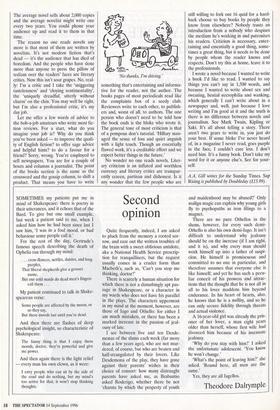Second opinion
SOMETIMES my patients put me in mind of Shakespeare: there is poetry in their utterances, and it echoes that of the Bard. To give but one small example, last week a patient said to me, when I asked him how he had been since last I saw him, `I was in a foul mood, or bad behaviour some people call it.'
For the rest of the day, Gertrude's famous speech describing the death of Ophelia ran through my mind:
... crow-flowers, nettles, daisies, and long purples,
That liberal shepherds give a grosser name, But our cold maids do dead men's fingers call them ...
My patient continued to talk in Shake- spearean verse: Some people are affected by the moon, or so they say, But these moods last until you're dead.
And then there are flashes of deep psychological insight, so characteristic of Shakespeare: The funny thing is that I enjoy these moods, doctor, they're powerful and give me power.
And then again there is the light relief — every man his own clown, as it were: I envy people who can sit by the side of the road and do nothing, but my mind's too active for that, it won't stop thinking thoughts. Quite frequently, indeed, I am asked to pluck from the memory a rooted sor- row, and raze out the written troubles of the brain with a sweet oblivious antidote, aka a National Health Service prescrip- tion for tranquillisers, but the request usually comes in a cruder form than Macbeth's, such as, 'Can't you stop me thinking, doctor?'
There is scarcely a human situation for which there is not a disturbingly apt pas- sage in Shakespeare, or a character in my wards who does not have his parallel in the plays. The characters uppermost in my mind at the moment, however, are those of Iago and Othello: for either I am much mistaken, or there has been a marked increase in the passion of jeal- ousy of late.
I see between five and ten Desde- monas of the slums each week (far more than a few years ago), who are not mur- dered, of course, but who are beaten and half-strangulated by their lovers. Like Desdemona of the play, they have gone against their parents' wishes in their choice of consort: how many distraught parents have asked me, as Brabantio asked Roderigo, whether there be not `charms by which the property of youth and maidenhood may be abused?' Only malign magic can explain why young girls fly to psychopaths as iron filings to a magnet.
There are no pure Othellos in the slums, however, for every such demi- Othello is also his own demi-Iago. It isn't difficult to understand why jealousy should be on the increase (if I am right, and it is), and why every man should work himself up into a lather of suspi- cion. He himself is promiscuous and committed to no one in particular, and therefore assumes that everyone else is like himself; and yet he has such a pecu- liar conceit of his prowess and attrac- tions that the thought that he is not all in all to his lover maddens him beyond endurance. In his heart of hearts, also, he knows that he is a nullity, and so he can only secure fidelity through threats and actual violence.
A 16-year-old girl was already the pris- oner of her lover, a man eight years older than herself, whose first wife had divorced him because of his insensate jealousy. `Why do you stay with him?' I asked the unfortunate adolescent. `You know he won't change.' `What's the point of leaving him?' she asked. 'Round here, all men are the same.'
Yes, they are all lagellos.
Theodore Dalrymple


































































 Previous page
Previous page